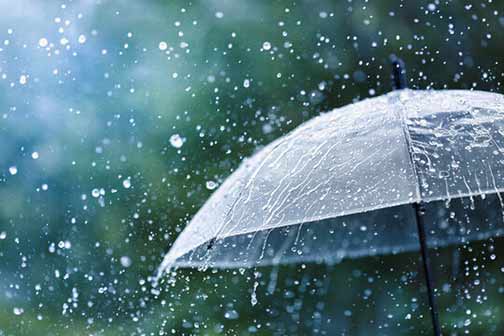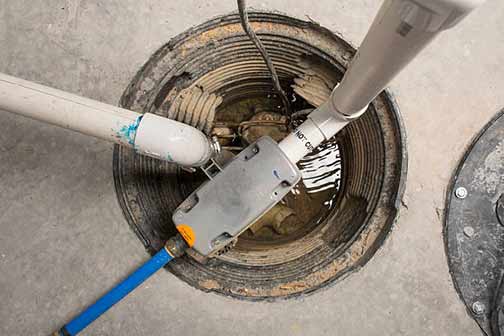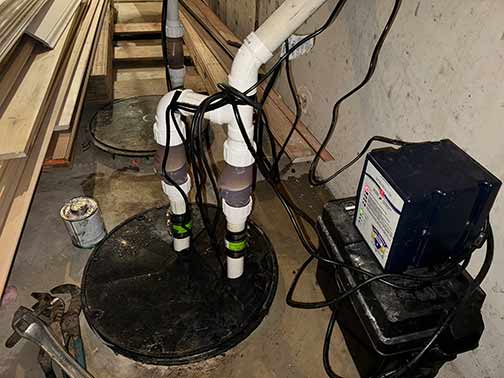
When heavy rainfall strikes, homeowners can face various challenges, from potential flooding to the performance of essential systems like sump pumps. Sump pumps play a critical role in preventing water damage and maintaining the integrity of basements and crawl spaces. Here we will explore the impact of heavy rainfall on sump pump performance and discuss strategies to ensure their effectiveness during such weather events.
Understanding Sump Pumps
Before delving into the impact of heavy rainfall, let’s first understand what sump pumps are and how they work. A sump pump is a device installed in the lowest part of a basement or crawl space, known as a sump pit or basin. Its purpose is to collect excess water and pump it away from the building, preventing flooding and water damage.
Sump pumps are typically powered electrically and feature a float switch that activates the pump when water reaches a certain level. Once activated, the pump removes the water through a discharge pipe and directs it away from the property.
The Role of Sump Pumps in Heavy Rainfall
During heavy rainfall, sump pumps become even more crucial in protecting homes from potential water damage. Heavy rain can result in an excessive amount of water accumulating around the foundation of a building. If this water is not effectively managed, it can seep into basements or crawl spaces, causing structural damage, mold growth, and other issues.
Sump pumps work tirelessly during heavy rainfall to collect and redirect this excess water, keeping it away from the foundation. However, several factors can impact the performance of sump pumps during such weather events.

Over time, debris, dirt, and sediment can accumulate in the sump pit, potentially clogging the pump impeller or causing other mechanical issues.
Factors Affecting Sump Pump Performance
Pump Capacity and Power
The capacity and power of a sump pump play a vital role in its ability to handle heavy rainfall. When selecting a sump pump, it’s crucial to consider the pumping capacity, usually measured in gallons per hour (GPH) or gallons per minute (GPM). A pump with a higher capacity will have a greater ability to handle larger volumes of water.
Additionally, the power supply of the sump pump is also significant. Power outages can occur during storms, rendering the pump ineffective if it solely relies on electricity. Investing in a battery backup sump pump or a generator can provide a reliable power source and ensure continuous operation even during power disruptions.
Sump Pit Maintenance
The maintenance of the sump pit is often overlooked but is critical for the optimal performance of the pump. Over time, debris, dirt, and sediment can accumulate in the sump pit, potentially clogging the pump impeller or causing other mechanical issues.
Regular maintenance, including cleaning the sump pit and inspecting the pump components, is recommended to ensure unrestricted water flow and prevent any obstructions that may hinder the pump’s functionality during heavy rainfall.
Sump Pump Age and Condition
The age and condition of the sump pump can significantly impact its performance during heavy rainfall. Older pumps may experience wear and tear, reducing their efficiency and ability to handle larger volumes of water.
Homeowners should regularly inspect their pump and consider replacing older sump pumps or those showing signs of deterioration. A reliable and up-to-date sump pump is crucial in protecting your home during heavy rain events.

Investing in a battery backup system provides an additional layer of protection in the event of power outages during heavy rainfall.
Strategies for Ensuring Sump Pump Effectiveness
While heavy rainfall can pose challenges, there are several strategies homeowners can employ to ensure the effectiveness of their sump pumps.
Battery Backup Systems
Investing in a sump pump battery backup system installation provides an additional layer of protection in the event of power outages during heavy rainfall. These systems automatically activate if the primary power supply fails, ensuring continuous operation of the sump pump and preventing potential flooding.
Regular Maintenance
Maintaining the sump pump and its components is crucial for optimal performance. Regularly inspecting the pump, cleaning the sump pump and pit, and testing the float switch can help identify any issues before heavy rainfall occurs.
Additionally, checking the discharge pipe and ensuring it is clear of obstructions will allow water to be efficiently pumped away from the building.
Consider a Secondary Pump
In areas prone to heavy rainfall, homeowners may consider installing a secondary sump pump for added protection. Dual sump pump systems can ensure redundancy and provide a backup if one pump fails or becomes overwhelmed by the volume of water.
Professional Inspection and Maintenance
While regular homeowner maintenance is essential, it is also advisable to schedule professional inspections and maintenance for your sump pump system. Professionals can identify potential issues that may not be immediately apparent and perform any necessary repairs or replacements.
Professional maintenance can provide peace of mind during heavy rainfall, knowing that your sump pump is in optimal condition and ready to handle any water accumulation effectively.
Heavy rainfall can undoubtedly impact the performance of sump pumps, threatening the risk of water damage and flooding. Understanding the role of sump pumps, factors affecting their performance, and implementing appropriate strategies for ensuring their effectiveness is crucial for homeowners.
By investing in reliable sump pump systems, performing regular maintenance, and considering backup solutions such as battery backups or secondary pumps, homeowners can mitigate the risks associated with heavy rainfall and protect their properties from potential water damage.